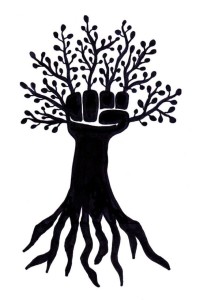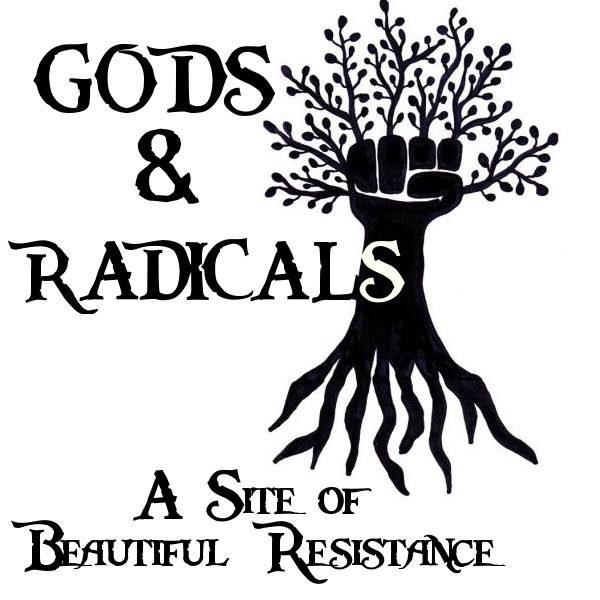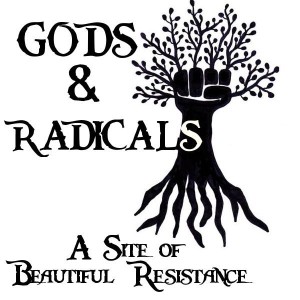It’s a strange night. The full moonlight is diffused through the mist, illuminating everything moving in the wind. It’s not as bright as a full moon in a clear sky, but there is plenty of light to see by — everything has a silvery glow. The breeze is comfortable: cool, not chilling, and it smells like a long-lost friend. It’s a scent I know well, but haven’t experienced in a while. It’s the smell of winter. She is coming.
One of my most sacred practices as a pagan is spending time in nature, no matter the season and in all weather, as often as possible. I try to do the best I can with this practice, but the realities of my domesticated life mean that sometimes weeks go by where the best I can do is to put my bare feet onto the ground (or snow!) just long enough to watch the sunset through the trees for a few moments. Most often I am outside in my own local ecosystem, in the woods where I live. To me, being outside in nature is the essence of what it means to be pagan — “pagan†is Latin for “redneckâ€; literally translated paganus means “country-dweller.†This term came into widespread use in the Roman Empire, with so much of Roman culture centered on the glory of the city of Rome. Paganus was used to describe those alienated from Rome-the-city, away from the direct protections of the Roman Empire, and the nascent conveniences of urban civilization. It described those who lived in nature.
Now in the 21st century, it is difficult to appreciate this pagan way-of-dwelling, this pagan ethos of living in honorable relationship with nature, since the vast majority of us are urbanized, domesticated creatures who have our basic survival needs met by our participation in the infrastructures of civilization. Our ancestral, pagan lifestyles are no longer the default way we live our day-to-day lives. If we truly want to live as pagans, I believe we must work to learn and reclaim these ways-of-being by not relying upon the very structures that have alienated us from them. It is up to each of us to individually decipher these once-common skills and abilities buried deep within our collective, ancestral memories. Luckily, there are clues everywhere, embedded in our pagan traditions.
For instance, we can look at the four Hallows, the cardinal tools depicted in many neopagan traditions. These four tools can be found in the four suits of the tarot — blade, cup, wand, and disc. These are powerful symbols and magical archetypes, but they are also the basic tools of survival our ancestors have carried on their persons for thousands of years, enabling them to live more fully in nature. A knife is arguably the most important tool one can have. It allows one to create other tools — I think of it as a meta-tool. Its primitive ingenuity is a result of higher circuits of consciousness exhibited in humans: some shrewd primate in our distant past discovered the utility of a sharp stone edge, which later evolved into flintnapping, and still later into the sophisticated techniques of forging metal into cutting tools. Wise, insightful humans imagined and understood these techniques, which over time came to be sacred. Magically, the knife, the blade, the athame, is an air symbol, representing intellect and imagination. The knife allows the magical practitioner to cut through layers of illusion, increasing one’s ability to live well, to adapt to one’s environment, and ultimately to literally carve one’s stake into the ecosystem.
The cup is important in a survival situation because we all need a source of clean, potable water; without it, we will die in a matter of a few days. As a symbol for water, the cup represents intuitive and emotional being. Interestingly, symptoms of dehydration include dizziness, unexplained tiredness, irritability, headache, insomnia, confusion, fatigue, and negative moods. Is it any wonder that the cup represents the emotional realm to the modern neopagan?
The wand is associated with fire, and most of our ancestors carried such wands with them for their use in firestarting. All ancient cultures in all parts of the world have devised ways to create fire using only materials from their ecosystem, such as the hand drill or the bow drill, both of which require wand-like pieces of wood with which to create heat through friction. If one has these tools, along with dry tinder and an adequate supply of wood (fuel), one is never far from fire. The ability to make fire — particularly in colder climates — means the ability to survive. It is also the magical ability of transformation: wood logs become ash; raw animal flesh becomes delicious meat; or a wet, shivering body becomes warm and comfortable. The fact that fire can also transform a vibrant, living forest into a charred wasteland shows us the dark side of its power. Fire’s transformative power is inherently neutral, so those working with it soon learn to be careful. When used skillfully, fire is another tool to survive — and to transform our immediate ecosystem into something that allows us to better live within it.
Finally, the disc (or coin, or pentacle) is the earth symbol, and has the most abstract connection to traditional survival tools. It is the most unclear of the four Hallows to us modern humans. For instance, in the famous Ötzi the Iceman discovery of a startlingly-well preserved 5,000 year old human corpse in Europe, one piece of gear he carried with him was a Stone Disc and its use remains unclear to those studying him. In some Wiccan traditions, the earth symbol is used to cast sacred space, to create a within to which there is an outside. It is a boundary. It is, in a word, shelter, yet another basic requirement for survival. In other traditions, it can serve as a plate for food offerings — food being another earth-nourishment necessary for survival.
Air, Earth, Fire, Water. Knife, Shelter and Food, Firestarter, Cup. Our ancestors were not speaking abstractly or arcanely, they were speaking practically, telling us the Hallows, the sacred tools, necessary for us to subsist in right relationship with nature. This, to me, is the core of what paganism is and should be — a set of traditional practices, rooted in nature, that allow us to live not only as spiritually awake, powerful humans, but also as a part of something greater than ourselves, from our local ecosystem all the way up to the living, breathing Earth itself and beyond. The many, when living this way, become one. This point of view has serious consequences for those of us living in the 21st century. Our planet is in deep crisis on countless fronts, from vast oil spills, nuclear radiation, and the toxins of industrial civilization now ubiquitous in every part of the planet, to the horrors of industrial, monocrop GMO farming devouring all the planet’s topsoil and leaving deserts in its wake. The tragic reality is that there is almost nowhere left on Earth where it is possible for large numbers of people to live in the wild as pagans, even if we wanted to. First of all, virtually the entire planet is now private property, so there are legal barriers. Secondly, 97% of the native forests, and 98% of the native grasslands, are GONE (see Derrick Jensen, “Preface†in Deep Green Resistance [New York: Seven Stories Press, 2011], p. 11.). Gone, as in no longer exist. Gone, as in 1 or 2% of nature is left for us to try to live as pagans, in a time when there are more humans, by far, than ever in history.
Yet, there is not enough outrage in our community. And if there is outrage, it is often squelched by other neopagans as “being negative†or “attracting negative energy†or “practicing bad magick.†As pagans — as those who aspire to live in harmony with nature — we should be on the front lines, protecting our ecosystems from the assaults they’ve been enduring for centries. Most of us, myself included far too much of the time, continue our domesticated lives as if nothing is wrong, divorced from authentic, meaningful relationship with nature except in the abstract, complaining about politics or climate change while living our lives as part of the vast machine causing the destruction in the first place. Lierre Keith sounds a wake-up call to the neopagan community in Deep Green Resistance:
Some white people say they want to “reindigenize,” that they want a spiritual connection to the land where they live. That requires building a relationship to that place. That place is actually millions of creatures, the vast majority too small for us to see, all working together to create more life. Some of them create oxygen; many more create soil; some create habitat, like beavers making wetlands. To indigenize means offering friendship to all of them. That means getting to know them, their histories, their needs, their joys and sorrows. It means respecting their boundaries and committing to their care. It means learning to listen, which requires turning off the chatter and static of the self. Maybe then they will speak to you or even offer you help. All of them are under assault right now: every biome, each living community is being pulled to pieces, 200 species [that go extinct each day] at a time. It’s a thirty-year mystery to me how the neopagans can claim to worship the earth and, with few exceptions, be indifferent to fighting for it. There’s a vague liberalism but no clarion call to action. That needs to change if this fledgling religion wants to make any reasonable claim to a moral framework that sacrilizes the earth. If the sacred doesn’t deserve defense, then what ever will (see Lierre Keith, “Culture of Resistance,†in Deep Green Resistance [New York: Seven Stories Press, 2011] pp. 165-166)?
Keith is right to criticize us in this way. We, as pagans, must lead the way by rediscovering ways of living that are not in conflict with our metaphysics, our theology, and our ethics. This Yule season, I challenge the Maine pagan community to begin embracing the pagan ethos by spending more time in nature and to reduce dependence on the “grid†for one’s sustenance. These are not abstract bits of theology, these are real things you can do immediately, things that will enrich your life, exercising mind, body, and spirit. For most of us, the following step would be a radical change: spend a day — or better yet, commit to one day per month or even per week — where you go off-the-grid entirely. Power down all electricity in your house. Turn your heater off for the day. Spend as much time outside that day as you can. Observe the flows of nature around you. Learn how to make fire using only materials found in your ecosystem. Don’t eat food from the grocery store; spend the day fasting or eat only what you can forage or hunt in your ecosystem. Drink only water from melted snow, hand-pumped from a well, or best of all collected from a spring if you have one near you.
Obviously, I’m not suggesting you endanger your life here. We are domesticated humans, and it will take time for us to re-learn how to subsist outdoors for extended periods of time in a Maine winter. But we can do it. Even if it’s only for an hour, for many of us that’s more time than we would normally spend outdoors in the winter. Take your first steps in this direction, be mindful of how you feel while you are outside — it is likely you will feel more alive than you have in a while. If nothing else, this is good training for the frequent power outages that come with the Maine winter.
As you get better and better at these practices, take fewer and fewer things with you, ultimately taking only your 4 personal Hallows (knife, cup, firestarter, shelter). If you make this a regular practice, journal it each time you do it. Record what you did that day, how you felt being in the wild all day, along with any lessons or insights gained. Nature in all of her vast forms will speak to us using her many languages, but we must be present in order to listen.
 Most of the writing has been over at Gods & Radicals, where I’ve written 3 articles since the last update here:
Most of the writing has been over at Gods & Radicals, where I’ve written 3 articles since the last update here:



